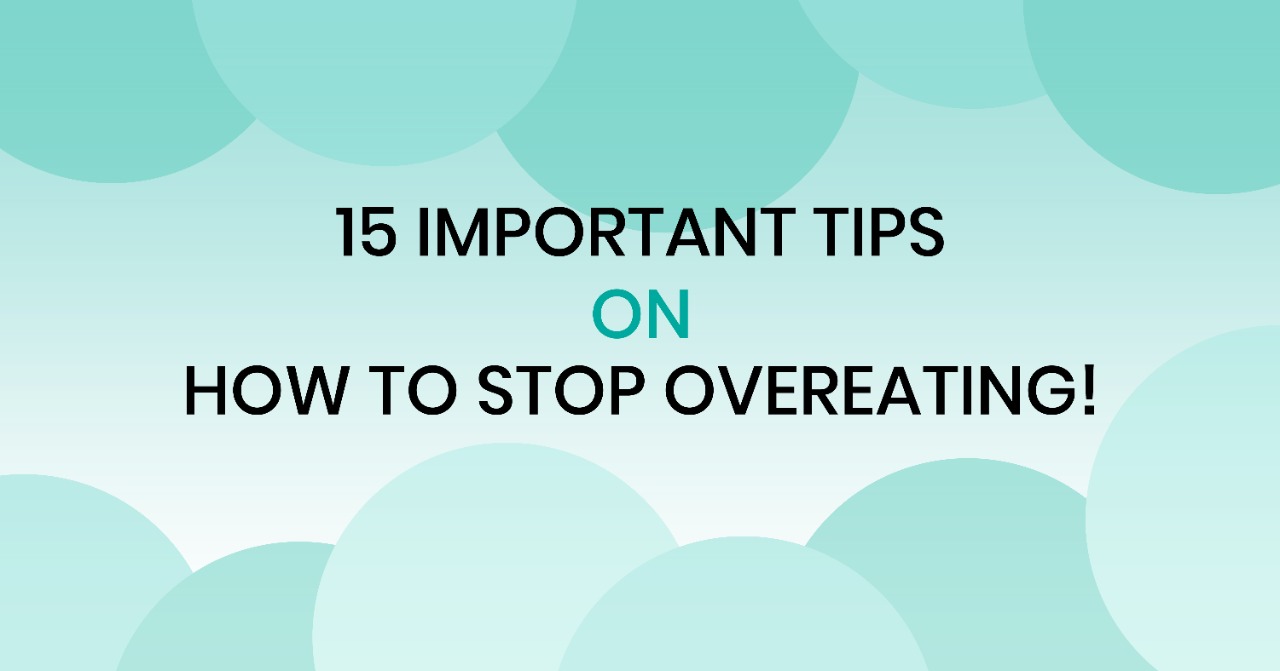How to stop overeating? 15 important tips!

Even though it is easy to advise someone to eat less, it is probably the most difficult task. Hunger is supposed to be stimulated when the body needs energy or nutrients.
Eating pattern and amount of food consumed depends on various factors including the hunger hormones, other hormones which induce hunger or satiation, hedonic drives, the interval between feeding, stress, emotions, etc.
Hedonic hunger is the pleasure of eating in the absence of any deficit. Even smells, visuals, or thought of food may stimulate hedonic hunger. High-calorie food and sugars have a higher potential for stimulating hedonic hunger. Hedonistic eating can easily override the body’s protective homeostatic mechanisms to control eating.
Certain individuals have an affinity for certain foods and there is wide variability between individuals. Even genetics is known to have a role in this.
Various other factors influence eating and they are the composition of food, palatability and these could further be different for people.
What happens in the body when you start eating less?
As you start eating less, you start losing weight. The body’s physiology always tries to get the weight back, by increasing the hunger hormone, called Ghrelin. For some, it is exceedingly difficult to fight against the craving or hunger-induced internally by the hormones. This happens more in those who have crossed a certain stage of obesity or have many failed attempts.
Excess craving, excess hunger, an increase in the amount of food consumed at one time or over a period suggests some hormonal or metabolic imbalance. It could be induced by genetic susceptibility, some medications, stress, depression, or even a hormonal imbalance in the body. Such individuals need help from an obesity expert.
Keeping all the above in mind, let us understand how one can stop overeating.
Simple tips:
1. The smaller size of the plate and the smaller size of the serving.
This is to give a signal to your brain that your plate is full.
2. Drink a lot of water for the whole day.
Water is the best medicine without any side effects(those with kidney disease need to follow their nephrologists’ advice).
3. Eat more proteins or consume food with a rich source of protein as the main component of the meal.
4. Consume more fiber in your diet. This will help improve your satiety.
5. Have smaller bites or cut foodstuff into smaller pieces. Eat slowly and chew your food till it is converted into a paste. This will make your brain feel that you are eating more, and some compensatory changes can be overruled.
6. Eat on time and follow a certain schedule which is feasible.
7. Follow your circadian rhythm for food and sleep.
Circadian rhythm is a physiological, biological, and behavioural cycle that has an impact on mentation, metabolism, and hunger. Sleeping at night is an example of light-related circadian rhythm and maintaining these is important for better health.
8. Make your meal colourful, by addition of vegetables and fruits. This improves your hedonic affection towards healthier food, and these are rich in nutrients, antioxidants, and vitamins. Consuming adequate quantity and quality of nutrients prevents deficiencies and will further reduce overeating induced by the body in demand for certain nutrients.
9. Concentrate on your meal while eating. Avoid the use of mobile while eating and avoid eating while watching TV or working on a computer.
Diverting your brain away from your food or eating reduces your brain’s capacity to identify that you are full. This results in overeating.
10.Mindful eating: Mindfulness is a philosophy to be used while eating. Identify your external food cues. Eat for survival and better health and not only for pleasure.
11. Add bulk to your food using items rich in protein, fiber, and are low in calories. This can be done as per individual choices. The intention should be to lower the total intake of calories.
12. Do not stock sweets, junk food, or high-calorie food. If your mind knows that it is stocked, your hedonic hunger drives may get stimulated.
If at all you have some of it stocked, try avoiding the smell or visual as a food cue and keep it stored away from the dining area in an opaque and airtight container.
13. You can use some meal replacements that are low calorie, high protein, and high fiber. These can be used initially as a meal replacement or as an alternative to a snack.
14. Regular exercise is important and a combination of low resistance and high resistance exercise at least for 20 to 30 minutes a day, or at least three times a week preserves and improves your lean body mass/muscle mass while you are eating less. This in combination with a healthy and balanced diet makes it a healthy weight loss.
15. Stress management is equally important to stop overeating. There are various ways to reduce stress and one should opt for an appropriate option or a combination of options.
Caution:
A stitch in time saves nine!
Start early and attempt as much.
If you are not able to achieve optimal success, you may need help with some pharmacotherapeutic agents after a thorough evaluation and investigation.
Those with morbid obesity or associated disorders may find it difficult to achieve success with these tips. It is not their fault nor a lack of motivation. For them, it is a disease of hormones and metabolism beyond their capacity to fight.
Bariatric and metabolic surgery is the only scientifically proven method for long term weight loss and success for these unfortunate ones. And after the surgery and correction of hunger hormones and other hormones governing metabolism, it is so easy and enjoyable for them to follow all these tips to maintain success for years.


